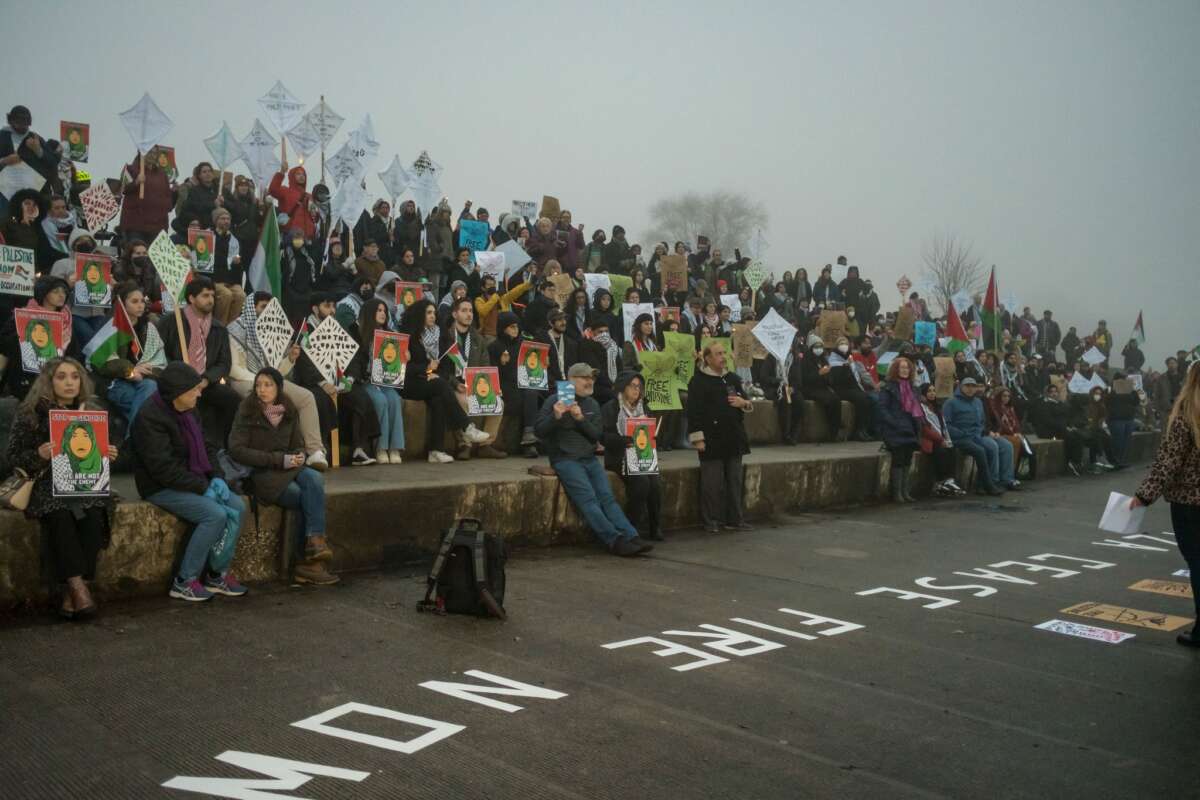On Saturday, hundreds of people gathered at Chicago’s lakefront to mourn the late Palestinian writer, poet, professor and activist Refaat Alareer. The event was a moment of protest, poetry and remembrance, organized by Chicago-based friends of Dr. Alareer and local movement artists. Originally conceived of as a small gathering, the vigil drew hundreds of attendees, who filled the concrete steps along the lake at Chicago’s Montrose Harbor Moonrise Observation Point. Kite-shaped signs were scattered throughout the crowd, while some attendees held electric candles amid a thick winter fog. A kite-shaped shrine featured the words of Alareer’s now-famous poem, “If I Must Die,” beside a table where attendees wrote words of love and solidarity on ribbons which were linked together to make a kite tail.
Since October 7, 2023, at least 20,000 Palestinians have been killed in Israeli attacks, according to Gaza’s Government Media Office. Within that number, over 80 Palestinian storytellers have been killed. Dr. Refaat’s death has been eulogized all over the world by artists and activists, particularly with stunning visuals of decorated, handmade kites and kite flying — all in an ode to one of his last poems posted online, “If I Must Die.”
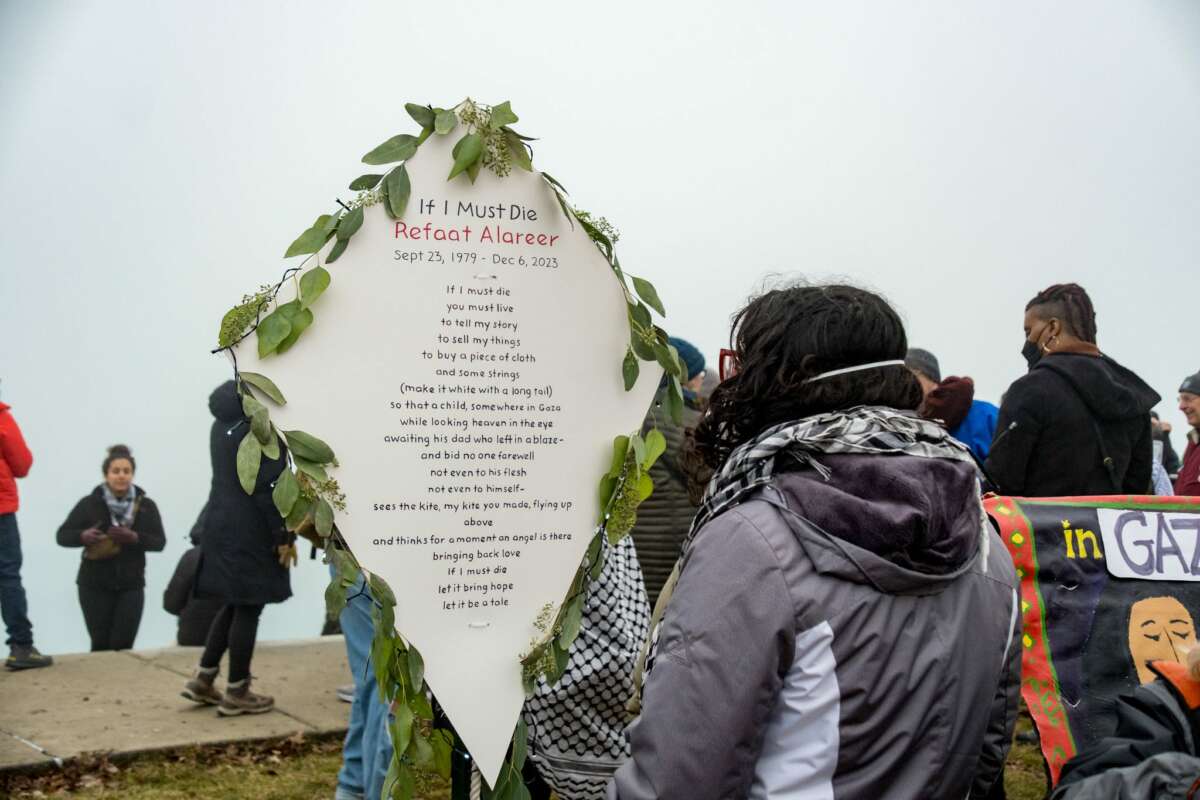
During the event, Alareer’s friends spoke of his mentorship, his love of Palestine, and his sense of humor. From the encouraging words Alareer offered to a young friend, who had lost the will to write poetry, to jokes he made with his colleagues about the world needing more freedom and more pizza, attendees heard stories that allowed us to feel both the ongoing presence and heart wrenching absence of a man who was a beloved thinker, writer and friend.
Organizers had planned to honor Alareer’s life and words by flying kites that had been constructed in his memory. As organizer Christine Irvine told me, “As we fight for the living in Palestine, we wanted to also be in community together to remember and uplift the voices of those lost, particularly Dr. Refaat Alareer and all storytellers who have been targeted, silenced, and martyred.” Irvine explained that organizers were inspired by Alareer’s poetry to fly kites in his memory. “We honor over 90 Palestinian journalists, poets, and writers killed in Gaza so their words will live on through us, strengthening our resolve and commitment to fight for a free Palestine,” Irvine said.
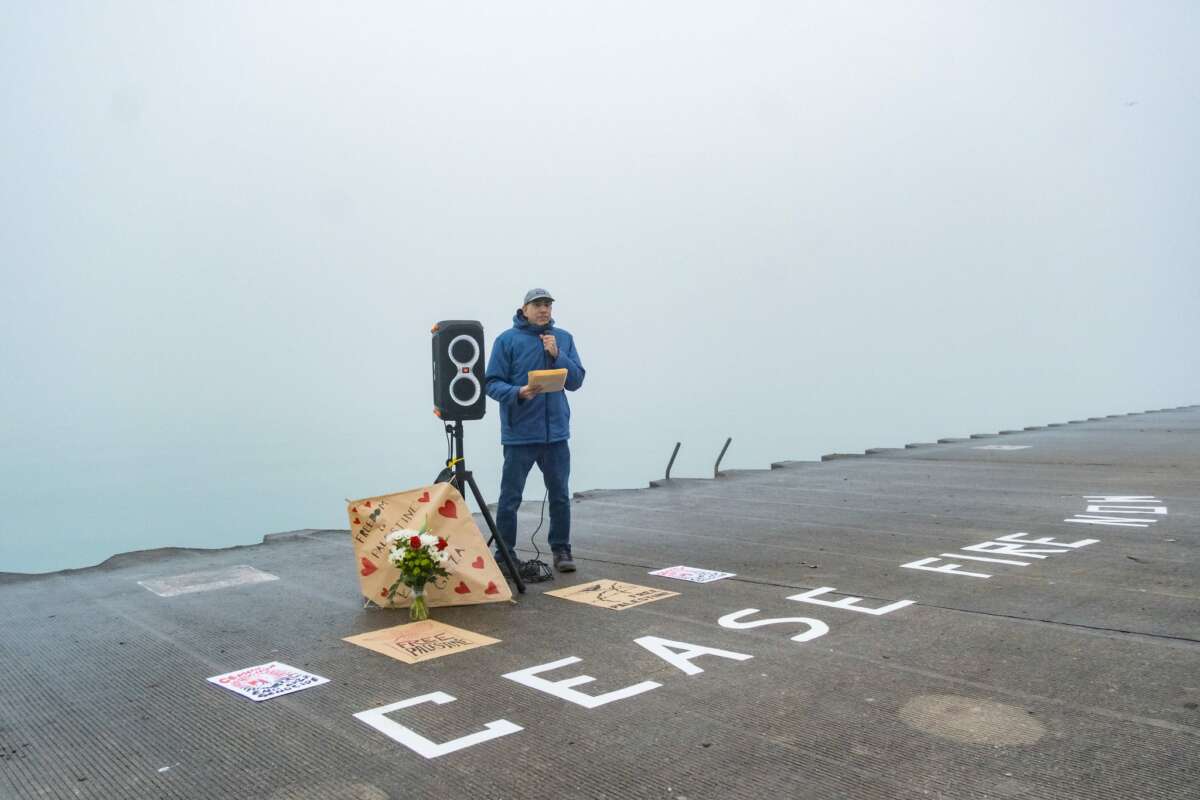
While kites were constructed for the event, there was no wind on Chicago’s lakefront Saturday. There was an unusually heavy fog in the air, blurring the horizon between the lake and the sky. The artists, activists and writers who addressed the crowd spoke against the backdrop of that great blue expanse, and as their words brought tears and laughter from the crowd, it felt as though we had gathered on the edge of this world, so that Palestine’s fallen poets, and their murdered loved ones, neighbors and friends might hear us in the next.
Nadine Naber, an organizer with Mamas Activating Movements for Abolition and Solidarity and the Palestinian Feminist Collective spoke to the spiritual nature of Saturday’s protest, telling me, “As we stood at the lake and heard the poetry and life stories of our martyred Palestinian poets … [we were] comforted by the sky and the water. It was as if the eyes of poets like Hiba Abu Nada and Refaat Alareer were watching us through the fog, and calling upon us to never stop, even for a second, fighting for Gaza and a free Palestine.” Naber explained that in that space of collective grief, where we mourned that so many Palestinians had been robbed of the chance “to live, write, love, [and] breathe” she could feel the fallen urging us forward, to advocate for Palestinian liberation “in every conversation, every space, every act, and in every breath we have the privilege to take.”
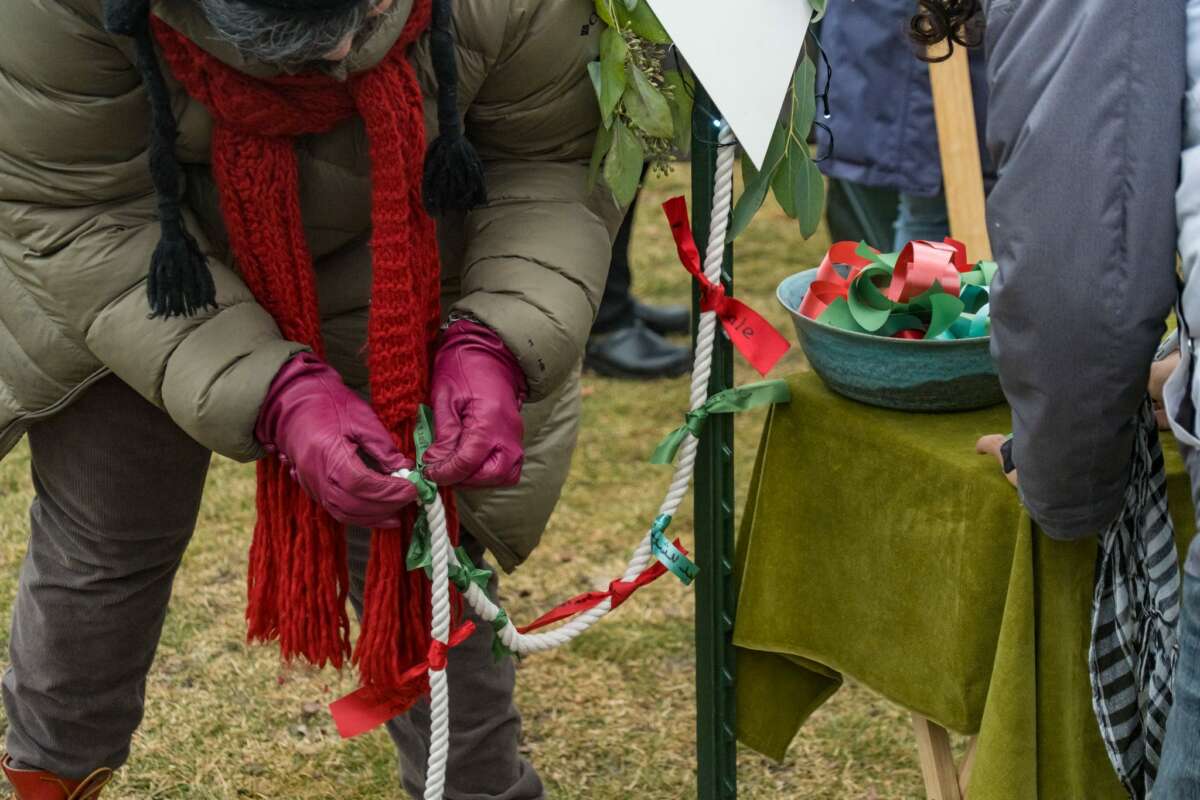
As the event came to a close, the names of martyred Palestinian storytellers were read aloud by Jannah, a member of Students for Justice in Palestine-Chicago, and attendees participated in a call and response reading of Refaat’s Poem, “If I Must Die.”
“The Chicago weather didn’t cooperate with our original visual plans of kite flying,” organizer Monica Trinidad told me, after the event. “But watching children with kites running so hard to get them up in the air, the unusually dense fog, and the sheer amount of people who came through to honor Refaat and all martyred storytellers was such a testament to our unyielding determination — Refaat’s stories will never die.”
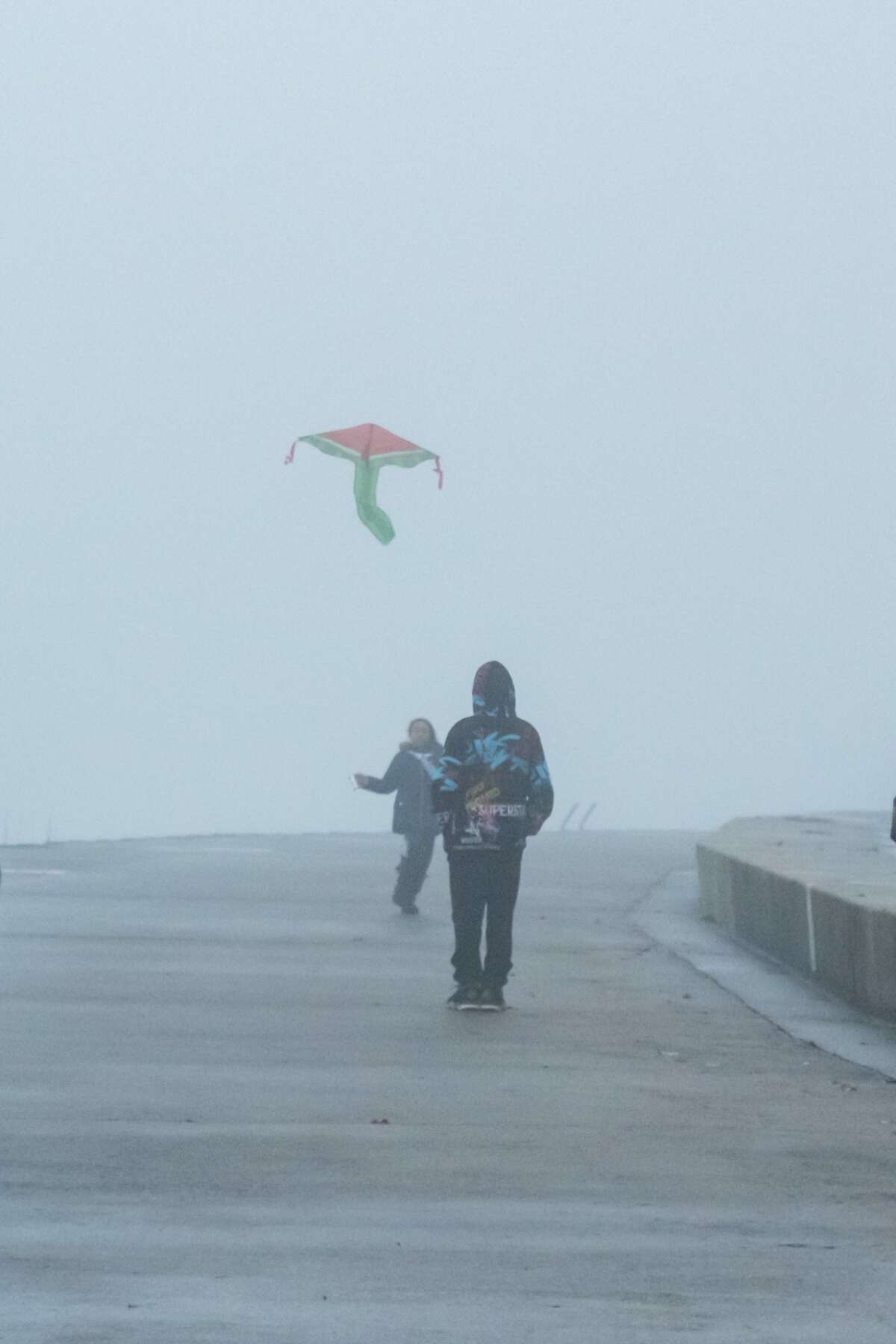
Trinidad’s description of the children attempting to fly their memorial kites on a still, foggy day encapsulates so much about this moment of protest and this moment in history. As Israel uses AI technology to mass produce targeting data and systematically murders poets, journalists, and other storytellers, the words of the fallen live on in our practice of grief, artistry, and defiance. The facts of human oppression, on their own, are not what movements are made of. Poets have always offered the rhythm of resistance and the rhythm of life itself. In movements, creative spirits can make artists of us all as we use our hands, our bodies, and our voices to tell the stories of loss, love, and solidarity that unite us. Whether by tying our words together into kite tails or speaking in unison, movement art is not an individualist display, but an invitation into art, into the act of storytelling, and into the creation of a different world. In moments of direct action, we have the potential to embody art and story – like children, full of persistence and hope, running with kites on a still, foggy day, with their minds full of poetry. At that moment, they were the story of a movement – carrying Alareer’s kites, bearing forward against all odds, knowing that, even if it’s not today, those kites will fly, and Palestine will be free. While those present could not lift their kites far from the ground, they nonetheless lifted Alareer’s words from the page.
In, “If I Must Die,” Alareer wrote:
If I must die,
you must live
to tell my story
to sell my things
to buy a piece of cloth
and some strings,
(make it white with a long tail)
so that a child, somewhere in Gaza
while looking heaven in the eye
awaiting his dad who left in a blaze—
and bid no one farewell
not even to his flesh
not even to himself—
sees the kite, my kite you made, flying up
above
and thinks for a moment an angel is there
bringing back love
If I must die
let it bring hope
let it be a tale.
Palestinian journalist Motaz Azaiza has called the Mediterranean Sea his “only healer” amid the genocidal assaults on Gaza. As someone who thinks of Lake Michigan as a healer, a friend, and a close living relative, I can relate to Azaiza’s words. As we gathered by the lake in Chicago, and gazed out into its hazy, blue view of eternity, I felt a sense of connection, to Alareer and other Palestinians who have been killed by Israel’s genocidal onslaught, and to Palestinians like Azaiza, who, like us, go to the water to grieve, to remember, to heal, and to experience love.
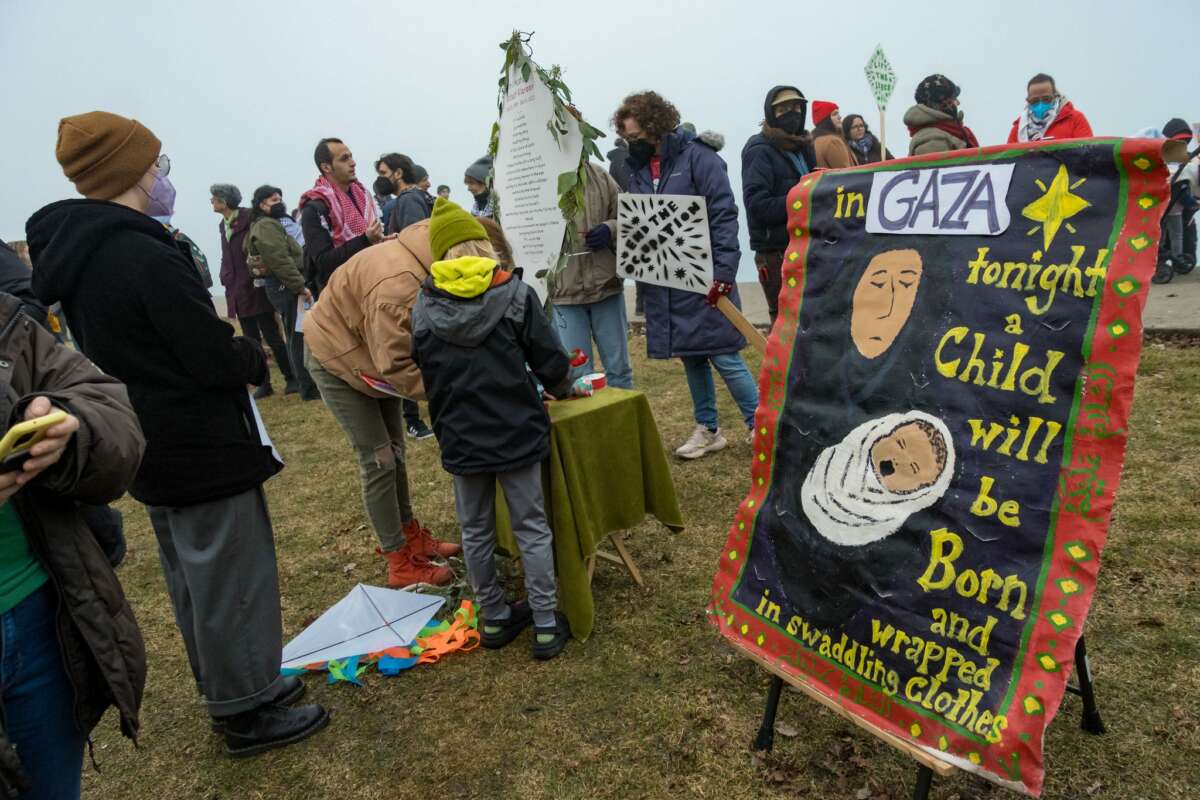
On a day when the naked eye cannot tell where the lake ends and the sky begins, who is to say where one body of water ends, and another begins, or how far the sound of poetry, echoed by hundreds of voices, might carry? Perhaps the power of love and solidarity can make such miracles — moments when Lake Michigan and the Mediterranean Sea become a single blue expanse, allowing mourners in Chicago to hear the people of Palestine calling out to us. Perhaps they could even hear us calling back, promising to hold them in our hearts.
Some might dismiss such notions as mere fantasy, but the realities of time, space, and geography are hardly the point. Poetry and art transcend such constraints and allow us to feel such miracles. That has always been the power of storytelling, which is why fascists and death-makers are determined to silence such voices. Because poetry can transform, transport, and unite us, re-enlivening cynical hearts and comforting wounded souls. Through the fog of a Chicago winter and the fog of genocidal warfare, art reminds us of who we are to each other and what we owe to each other. May we continue to lift such words from the page, to live them out loud across time and space. As long as we draw breath and call out for justice, “let it be a tale.”
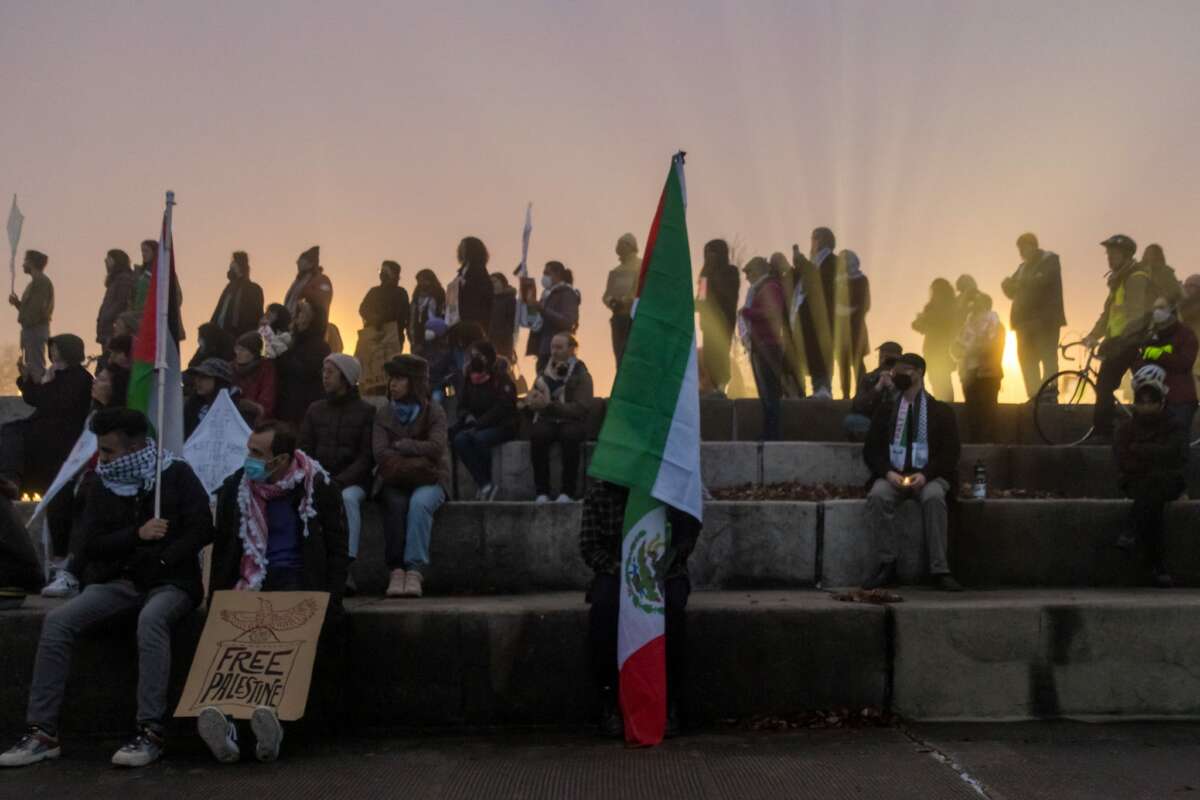
Press freedom is under attack
As Trump cracks down on political speech, independent media is increasingly necessary.
Truthout produces reporting you won’t see in the mainstream: journalism from the frontlines of global conflict, interviews with grassroots movement leaders, high-quality legal analysis and more.
Our work is possible thanks to reader support. Help Truthout catalyze change and social justice — make a tax-deductible monthly or one-time donation today.
